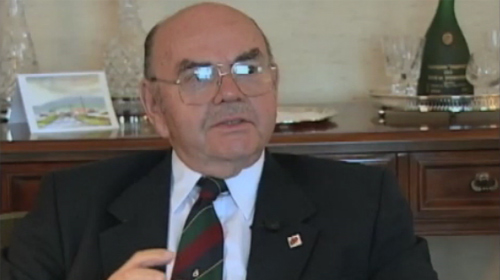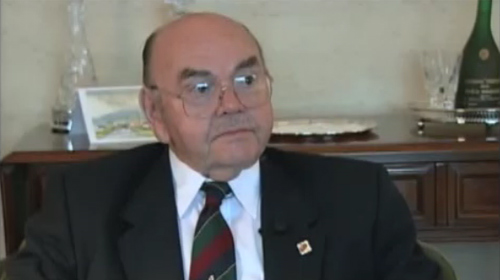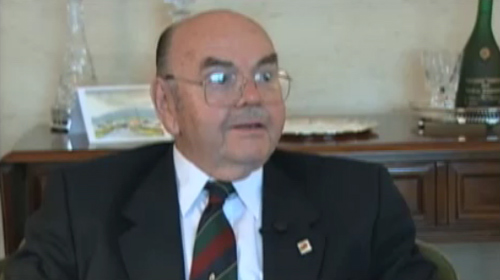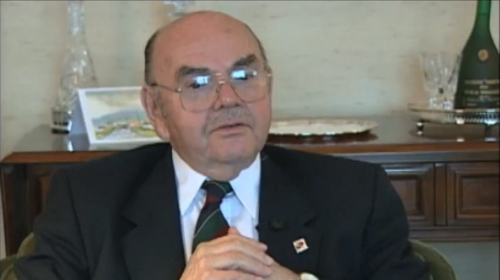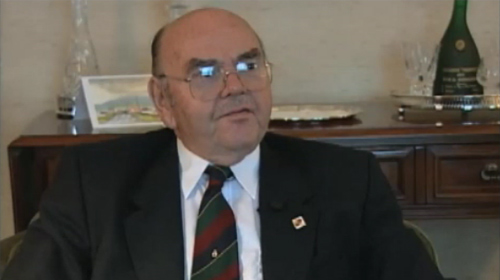Interviewer: Tell me sir, when you look back
on your service, in the Canadian military,
during World War II and being part of the
momentous invasion of Continental Europe,
when you think back on that experience,
your wounding, subsequent convalescence.
How would you say that experience
affected you, in later life?
Well, I think it definitely made a mark and
I do stress that, and I am very,
very conscious of this that, that the,
I did not go in, in the assault wave.
I came right behind the assault wave.
I was there three days and I got hit and
I use to say joking that the day it took,
the fact it took Gerry three days to hit
a fella my size, shows they weren't
that great shots, but.
So and I realize that there are many
people who went in on the assault and
worked through the whole war.
So I'm not sure, but the ones that I've
talked to or know their, their attitude is
pretty much the same as mine (inaudible)
So I don't pretend to set myself up as,
as having been there throughout the
whole thing and so on.
I wasn't and I know that.
But, I would say that what it did,
in my case, is like my friend, I told you,
the retired professor who said what,
what he learned about the
appreciation of mankind. I think that it
gives you an appreciation of human nature.
That is hard to get, elsewhere, and I would,
I would not hesitate when I think back,
you know there were, there was the odd
person who maybe, might of done something
a bit dishonest, if he had a chance.
I don't pretend to know that,
but not in my, my experience.
The test was when you needed them they
were there and they didn't let you down.
When I think back and I think about people
who talk about race and in my platoon my,
my batmen was a chap, whose a coloured
chap and there couldn't be a better soldier.
I'll see him in Fredric, in Saint John on my
way through to Fredericton for the D Day reunion.
Don Alberts, you wouldn't find a better soldier
anywhere. My platoon sergeant, George Coles,
father won the Military Cross in the
British Army in the first war and then his
father moved to the States.
George was born in the States, but come up to
Canada because the Americans weren't at
war and he was in the army here and
he was my platoon sergeant D-Day.
George and I still correspond and talk
back and forth on the phone.
My Corporal Opeact was Bob Shampoo
who was a French Canadian.
Again you wouldn't find a better, a better fellow.
My Bren Gun carrier driver was an English
chap who came out as an orphan and
he had quite an accent and he was called,
was called Limmy Divil, his name was Divil,
Limmy with Divil. My wireless operator was
an American Jew by the name of Cohen.
You got all races all religions and
so on and yet they were a team.
They were a family and I, to answer
your question it's a long answer I know,
but I think that what it gives one is an
appreciation of, of, of human nature and
appreciation of value of a, of a, of a human
nature a value of people when they're
part of a team and it's what people loose
out if they don't look on people
as a part of a team. If people want to be an
isolationist and be just for themselves they,
it must be a pretty shallow life.
But, but I don't know, I think maybe I
told you the story about a couple years ago
when I was over at Inverary unveiling that
Canadian wall there at the museum for in
memory of the Canadians and I was
sitting in the, in the a lounge in the hotel and
this chap asked me if it was my first visit
to Inverary, where we did our
combined ops training. And I said, no I'd been
there fifty-three years before and he said,
oh he said, what were you doing then.
And I told him about the combined ops
training and about the war and so on.
And then he said, I said, is this your
first visit here and he said, yes, he said,
I'm a. I said where do you live, he said,
I am just in Glasgow now, but my home is
just a few miles outside of Berlin.
So I said if I said anything about the war
that offended you I apologize.
He said no, he said not at all, he said every
thinking German would agree with me
when I say to you, thank god,
you won and Hitler lost. He said we're free.
If Hitler had won we would not be free,
so thank god you won. And I think that's the
important thing that comes out of the war,
really is that we are free.
And that, that is worth a great deal.
Today we take it very much for granted.
Interviewer: Well tell me, Mr. Thompson,
is it important that young people and future
generations of Canadians come to understand
what you, and your generation endured?
I think it is important from the point of
view of the future of the country and
the value of freedom. I think freedom is
such an important thing and it's something
that comes at a price and if we take it
for granted, then we can loose it.
We can loose it not always just from
external forces, but you can loose it
from internal conditions. And so I think
it's important that they realize the price
that's been paid and realize that,
that they have to be willing, themselves,
maybe not to pay that high a price,
but to pay a price in, in conscious effort
and in citizenship, in loyalty to the
cause of the country and of
concern for their fellow man.



